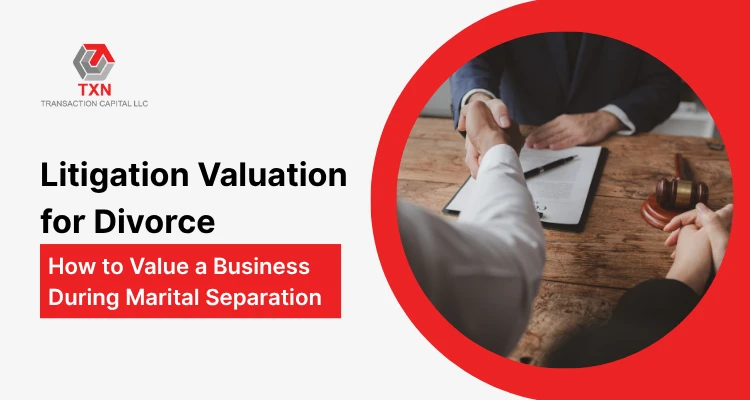Litigation Valuation for Divorce: How to Value a Business During Marital Separation

Going through a divorce can bring emotional and financial strain — especially when a privately owned business is involved.
Businesses often make up a significant portion of the marital assets, so obtaining a reliable and well-supported valuation is key to reaching a fair resolution.
This guide outlines the role of business valuation in divorce cases, the typical challenges that arise, and how certified professionals provide valuations that are legally sound and accepted by the courts.
Why Does Business Valuation Matter in Divorce Cases?
During marital dissolution, accurately determining business worth becomes critical for several reasons:
- Asset Division Requirements: Courts must divide marital property equitably, and a business often represents the couple's largest financial asset.
- Fair Market Assessment: Without public trading prices, privately held companies require professional appraisal to establish defensible market value.
- Buyout Calculations: When one spouse retains business ownership, precise valuation determines the compensation owed to the non-owning spouse.
- Hidden Asset Detection: Professional valuators can uncover income manipulation or asset concealment attempts.
What Makes Divorce Business Valuation Different from Standard Appraisals?
Legal Compliance Requirements
Litigation valuation for divorce differs significantly from routine business appraisals:
- Court-admissible standards: Reports must comply with USPAP, SSVS, and legal evidentiary requirements
- Expert witness capability: Certified professionals provide sworn testimony and defend methodologies under cross-examination
- Unbiased analysis: Neutral experts eliminate perceived conflicts of interest
- Comprehensive documentation: Detailed reports include all assumptions, limiting conditions, and supporting data
Specialized Divorce Considerations
Marital separation valuations address unique factors:
- Valuation date disputes: Timing can dramatically affect business worth
- Personal versus enterprise goodwill allocation: Determines which portions qualify as marital property
- Income normalization: Adjusts for owner compensation irregularities and personal expenses
- Forensic analysis: Detects financial manipulation or undisclosed revenue streams
How Do Courts Determine if a Business Qualifies as Marital Property?
Marital vs. Separate Property Classification
Marital Property Characteristics:
- Business acquired during marriage
- Company growth funded with marital resources
- Both spouses contributed to business development
- Appreciation due to joint efforts or shared investments
Separate Property Indicators
- Business acquired during marriage
- Pre-marital business ownership
- Inherited company interests
- Completely segregated business operations
- No spousal involvement or marital fund utilization
Critical Analysis Factors
Courts examine multiple elements when classifying business interests:
- Formation timeline: When was the business established relative to marriage?
- Capital sources: Were marital funds used for business investment or operations?
- Spousal involvement: Did the non-owner spouse contribute time, expertise, or support?
- Commingled assets: Were personal and business finances properly separated?
When Should Business Valuation Occur During Divorce?
Valuation Date Selection Impact
The chosen valuation date significantly influences final business worth:
Common Valuation Dates:
- Date of separation
- Date of filing divorce petition
- Date of financial disclosure
- Date of trial or final hearing
Strategic Timing Considerations
Business values fluctuate due to market conditions, seasonal performance, and operational changes. Strategic valuation timing can affect settlement outcomes by hundreds of thousands of dollars.
Factors Influencing Optimal Timing:
- Industry performance cycles
- Company financial trends
- Market volatility periods
- Pending business transactions or contracts
What Role Does the Business Valuation Expert Play?
Core Expert Responsibilities
Certified valuation professionals serve multiple critical functions:
- Financial Analysis: Normalize income statements, identify trends, and project sustainable cash flows
- Market Research: Analyze comparable transactions and industry benchmarks
- Report Preparation: Create comprehensive, court-admissible documentation
- Expert Testimony: Provide sworn witness testimony and defend methodologies during trial
The Expert Witness Advantage
Our certified experts regularly serve as expert witnesses in divorce trials, offering:
- Sworn Testimony: Professional opinions on valuation methodologies and business worth
- Cross-Examination Defense: Experienced professionals who can defend their analysis under legal scrutiny
- Assumption Clarification: Clear explanations of valuation assumptions and industry data sources
- Neutral Credibility: Reputation as unbiased, credentialed experts ensures court respect and trust
This expert witness capability proves invaluable when valuation disputes require judicial resolution.
What's the Difference Between Fair Market Value and Fair Value in Divorce?
Valuation Standards Explained
| Standard | Description |
|---|---|
| Fair Market Value (FMV) | Price between a willing buyer and seller under no compulsion |
| Fair Value | Often used in shareholder or divorce contexts; may exclude discounts |
| Investment/Intrinsic Value | Value to a specific buyer; typically not used in divorce |
Discount and Premium Applications
- Minority Interest Discounts: Applied when valued ownership lacks control rights
- Marketability Discounts: Reflects difficulty selling private company interests
- Control Premiums: Added when ownership provides decision-making authority
Understanding applicable standards upfront prevents costly disputes and ensures appropriate methodological selection.
What Key Questions Drive Divorce Valuation Outcomes?
Critical Valuation Decisions
Several fundamental questions significantly impact valuation methodology and final business worth:
Timing Questions:
- What is the appropriate valuation date?
- Is the company operating as a going concern?
Ownership Structure Questions:
- What specific ownership interest requires valuation?
- Are minority discounts or marketability discounts appropriate?
Goodwill Allocation Questions:
- Is the goodwill personal or enterprise-based?
- Can business relationships transfer to new ownership?
Financial Analysis Questions:
- Are there related-party transactions affecting reported income?
- What normalization adjustments are necessary?
Each question directly influences both valuation methodology selection and final business worth determination.
How Does IRS Revenue Ruling 59-60 Guide Divorce Valuations?
The Comprehensive Valuation Framework
Most divorce valuation experts follow IRS Revenue Ruling 59-60, which establishes systematic analysis of eight key factors:
Business Fundamentals:
- Nature and history of the business enterprise
- Economic outlook and specific industry conditions
Financial Performance:
- Earning capacity and overall financial health
- Dividend-paying capacity and payment history
Intangible Considerations:
- Goodwill value and other intangible assets
- Control factors and prior arm's length transactions
Market Evidence:
- Book value and financial position
- Market price of similar publicly traded securities
This framework ensures consistency, transparency, and legal defensibility across all valuation assignments.
How Do Valuation Experts Address Income Manipulation?
Common Manipulation Tactics
Business-owning spouses may attempt various strategies to reduce apparent company value:
Expense Inflation:
- Excessive owner compensation
- Personal expenses run through business
- Unnecessary capital expenditures
- Related-party transaction manipulation
Revenue Suppression:
- Delayed billings or collections
- Cash transaction underreporting
- Customer relationship transfers
- Inventory manipulation
Professional Detection Methods
Expert valuators employ sophisticated techniques to uncover financial manipulation:
Forensic Analysis Tools:
- Multi-year trend analysis comparing revenue and expense patterns
- Lifestyle audits comparing reported income to actual spending
- Bank deposit analysis identifying unreported cash flows
- Related-party transaction reviews
Specific Detection Techniques:
- Bank deposits versus reported income reconciliation
- Lifestyle analysis comparing spending patterns to declared earnings
- Cash transaction discrepancies and unexplained differences
- Customer payment analysis for revenue timing manipulation
Income Normalization Process:
- Owner compensation benchmarking against industry standards
- Personal expense identification and removal
- One-time event adjustments
- Sustainable cash flow projections
Advanced Challenge Solutions
Startup and Seasonal Business Complications:
- Customized DCF methodology with scenario-based modeling
- Risk-adjusted projections accounting for business maturity
- Seasonal normalization requiring multi-year averaging
- Growth option valuations for early-stage companies
Complex Capital Structure Issues:
- Partnership agreement analysis and buy-sell provisions
- Multi-class ownership structures and voting rights
- Debt-equity hybrid instrument valuations
- Management incentive plan complications
What Valuation Approaches Work Best for Divorce Cases?
Asset-Based Approach
Best Applications:
- Holding companies with substantial tangible assets
- Businesses with volatile or negative cash flows
- Companies facing liquidation scenarios
Methodology: Values net tangible and intangible assets at fair market value, subtracting liabilities.
Income Approach Methods
Discounted Cash Flow (DCF):
- Projects future cash flows and discounts to present value
- Ideal for stable, growing businesses with predictable performance
- Requires detailed financial projections and risk assessment
Capitalization of Earnings:
- Applies capitalization rate to normalized earnings
- Suitable for mature companies with stable cash flows
- Simpler methodology requiring fewer assumptions
Market Approach Options
Guideline Company Method:
- Uses publicly traded company multiples as benchmarks
- Requires sufficient comparable companies
- Applies discounts for size and marketability differences
Guideline Transaction Method:
- Analyzes recent sales of similar private companies
- Provides direct market evidence when available
- Limited by comparable transaction availability
Weighted Approach Integration: Most court-ready valuations blend multiple methodologies, providing cross-verification and enhancing defensibility.
What Documents Are Required During the Discovery Process?
Mandatory Business Documentation
The business-owning spouse must produce comprehensive financial records during divorce discovery:
Financial Statements and Tax Records:
- 3–5 years of complete financial statements
- Business and personal tax returns
- General ledger and trial balance details
Compensation and Benefits Analysis:
- Owner compensation details and benefit structures
- Employee payroll records and benefit costs
- Management compensation benchmarking data
Operational and Strategic Information:
- Capital expenditure records and budget forecasts
- Business plans and financial projections
- Customer contracts and supplier agreements
Related-Party Transaction Documentation:
- All transactions between business and family members
- Loans, advances, and other financial arrangements
- Property leases and service agreements
Discovery Compliance Consequences
Failure to Disclose Penalties:
- Court sanctions and monetary penalties
- Adverse legal inferences drawn against non-complying party
- Additional discovery costs and attorney fees
Professional valuators coordinate closely with legal counsel to ensure complete documentation and compliance with court orders.
How Do Experts Normalize Financials for True Income Assessment?
Income Statement Adjustments
Valuation experts systematically adjust business financials to reveal sustainable earning capacity:
Owner Compensation Normalization:
- Inflated salary adjustments to market-rate compensation
- Below-market wage corrections for tax minimization strategies
- Benefit and perquisite valuations and adjustments
Personal Expense Elimination:
- Vehicle expenses for personal use vehicles
- Travel and entertainment costs for family activities
- Home office expenses and personal property costs
One-Time Event Adjustments:
- Lawsuit settlements and legal fee eliminations
- Windfall gains or extraordinary income items
- Non-recurring operational disruptions or costs
Sustainable Cash Flow Determination
These normalization adjustments reveal the true cash flow available to:
- Potential business buyers in fair market transactions
- Buyout calculations for marital property division
- Income capacity assessments for spousal support determinations
Forensic Analysis Integration: Professional valuators often combine normalization with forensic techniques to detect income manipulation and ensure comprehensive financial accuracy.
How Do Courts Handle Personal vs. Enterprise Goodwill?
Goodwill Classification Importance
Goodwill allocation directly impacts marital property division:
Enterprise Goodwill:
- Transferable business reputation and relationships
- Company systems, processes, and workforce
- Brand recognition and market position
- Divisible in divorce settlements
Personal Goodwill:
- Individual professional reputation
- Personal client relationships
- Non-transferable skills and expertise
- Typically excluded from marital property
Professional Service Business Considerations
For professionals like doctors, lawyers, or consultants, personal goodwill often comprises significant business value. Courts analyze whether relationships and reputation transfer with business ownership or remain personally attached.
Key Analysis Factors:
- Client relationship transferability
- Business operational independence from owner
- Revenue generation without owner involvement
- Contractual relationship structures
What Challenges Arise in Divorce Business Valuation?
Startup and Early-Stage Company Issues
Valuation Complexity:
- Limited operating history
- Uncertain revenue projections
- High failure rates requiring risk adjustments
- Intellectual property and growth option valuations
Specialized Methodologies:
- Scenario-based DCF modeling
- Option pricing model applications
- Risk-adjusted net present value calculations
- Comparable startup transaction analysis
Seasonal Business Considerations
Timing Impact:
- Valuation date selection affects seasonal business worth
- Cash flow normalization required for annual projections
- Working capital adjustments for seasonal fluctuations
Partnership and Multi-Owner Structures
Additional Complexity:
- Partnership agreement review and compliance
- Buy-sell provision analysis
- Minority interest discount applications
- Management control assessments
What Happens After Business Valuation is Complete?
Post-Valuation Settlement Options
Option 1: Business Buyout :
- Owner spouse retains business, compensates non-owner based on valuation
- Payment structures vary: lump sum, structured payments, asset offsets
- Most common resolution preserving business continuity
- Often includes structured payment plans or offsetting assets (house, retirement accounts)
Option 2: Business Sale :
- Both parties agree to sell and split proceeds
- Clean financial separation but potential value loss
- Rare due to business disruption concerns and market timing issues
Option 3: Continued Joint Ownership :
- Requires detailed legal structuring and ongoing cooperation
- High conflict potential and management complications
- Generally discouraged unless parties remain amicable and business-savvy
- Strict legal agreements necessary for decision-making and profit distribution
Implementation Considerations
Buyout Financing Options:
- Cash payments from business reserves or owner assets
- Installment payments with interest and security provisions
- Asset exchanges including real estate or investment accounts
- Third-party financing secured by business assets
Joint Ownership Risk Factors:
- Ongoing management disputes and deadlock scenarios
- Profit distribution disagreements and reinvestment conflicts
- Exit strategy complications and future valuation disputes
- Personal relationship deterioration affecting business operations
The Clean Break Principle
Courts favor complete financial separation post-divorce, minimizing future litigation risks. This principle influences settlement structures and judicial decisions.
Clean Break Benefits:
- Eliminates ongoing financial entanglements between ex-spouses
- Reduces future litigation risks and legal costs
- Provides emotional closure and relationship finality
- Simplifies tax reporting and financial planning
Implementation Strategies:
- Business buyouts rather than continued joint ownership
- Complete property and asset transfers without ongoing obligations
- Structured settlements eliminating future payment dependencies
- Clear documentation preventing future claims or disputes
The clean break approach guides courts toward solutions that provide definitive financial separation and reduce post-divorce conflict potential.
Real-World Case Study: Tyrell v. Tyrell
Case Background
In British Columbia, an architect claimed his professional firm held no significant value during divorce proceedings.
Court Findings
- Valuation Date: Court selected financial separation date rather than trial date
- Income Analysis: Personal benefits including company car and meals were added back to true income
- Spousal Support: Lifestyle analysis considered business-paid personal expenses
- Expert Testimony: Professional valuation contradicted owner's worthless business claims
Key Lessons
- Full financial disclosure prevents adverse court inferences
- Professional lifestyle analysis reveals true income capacity
- Expert valuation overcomes self-serving owner testimony
- Proper documentation supports equitable settlements
Advanced Valuation Considerations
Control and Marketability Adjustments
Control Premium Applications:
- Applied to controlling ownership interests
- Reflects decision-making authority value
- Based on empirical market data
Minority Discount Factors:
- Limited voting rights
- Restricted management participation
- Dependent on majority owner decisions
Marketability Discount Elements:
- Private company liquidity constraints
- Transfer restriction impacts
- Market absorption capacity limitations
Intangible Asset Valuations
Intellectual Property Assets:
- Patents, trademarks, and copyrights
- Trade secrets and proprietary processes
- Customer databases and relationships
- Technology platforms and software
Valuation Methodologies:
- Relief from royalty method
- Excess earnings approach
- Cost-to-recreate analysis
- Market transaction comparisons
Protect Your Financial Future with Expert Divorce Valuation
Divorce business valuation represents more than number-crunching—it's about securing your financial future and ensuring equitable treatment during one of life's most challenging transitions.
Transaction Capital LLC delivers comprehensive litigation valuation services including certified court-admissible reports, expert witness testimony, and post-valuation audit support. Our ABV®, ASA, CVA®, and MRICS certified professionals provide the expertise and credibility essential for successful divorce outcomes.
Whether you're a business owner protecting your interests or a spouse ensuring fair compensation, professional valuation services provide the foundation for informed decision-making and equitable settlements.
Ready to secure your financial future? Contact Transaction Capital LLC today for your free 15-minute consultation and discover how professional litigation valuation can protect your interests during divorce proceedings.
Frequently Asked Questions

Dr. Gaurav B.
Founder & Principal Valuer, Transaction Capital LLC
Specialist in IRS-Compliant 409A & Complex Valuation Matters
Dr. Gaurav B. is the Founder and Principal Valuer of Transaction Capital LLC, a valuation and financial advisory firm providing independent, standards-based valuation opinions for startups, growth-stage companies, and established enterprises.


